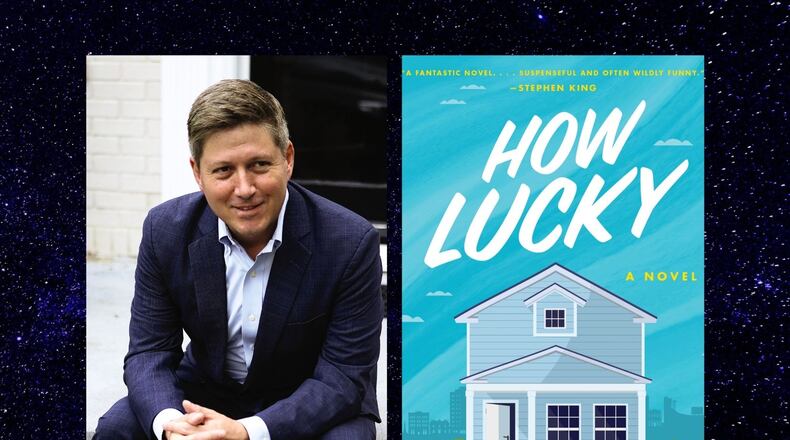The characters who inhabit Athens-based author Will Leitch’s debut novel are the kind of people who go about their days often unseen by the movers and shakers of the world: The Chinese exchange student who speaks little English. The Pakistani caregiver who makes ends meet with menial jobs. A disabled man strapped in a wheelchair who speaks with a computer-assisted voice. His loyal friend, a stoner and devoted video gamer. A loner willing to go to extreme measures to get someone to notice him.
In “How Lucky,” it’s as though they live in a parallel universe to the beautiful young students, coaches and athletes who fuel the collegiate engine that drives the town of Athens. Living in a place filled with people working toward degrees and careers that will one day take them far away, these fly-under-the-radar folks are the townies and the outsiders who, with one exception, are already living their futures.
The exception is Ai-Chin, the Chinese exchange student who goes missing at the beginning of this mystery. According to news reports, she seemingly vanishes into thin air. But Daniel realizes he might have unknowingly witnessed Ai-Chin’s kidnapping while sitting on his porch in his wheelchair early one morning. Conveying that information to the authorities and getting them to take it seriously, though, is no easy feat.
Daniel has spinal muscular atrophy (SMA), a degenerative disease similar to ALS (aka Lou Gehrig’s disease). The difference between the two is ALS strikes adults, and SMA strikes children. Because Daniel has very little control over his muscles, he requires a wheelchair to get around, a rotation of caregivers to keep him alive and a computer to speak out loud.
Despite Daniel’s physical challenges, his mind is razor sharp and so is his irreverent sense of humor. As the lead amateur sleuth in this crime caper, he provides the voice for “How Lucky,” and what a voice it is. Speaking directly to the reader like an old confidant, Daniel offers up amusing observations and wise insights about everything from Athens’ all-consuming passion for football to what makes his caretaker Marjani and his best friend Travis tick. In the process, he reveals himself to be both brave and vulnerable by sharing the unvarnished truth about the realities of living with a fatal disease.
“One of the many annoying things about being disabled is the obligation I always feel to make you feel better about your reactions to me. We’re used to your reactions. You’re the one with the problem here.”
Unlike most mysteries, the source of tension and intrigue in “How Lucky” isn’t derived from figuring out clues or chasing down red herrings. Instead, it is Daniel’s inability to communicate what he knows that creates friction.
When Daniel gets excited, he can manage to produce some indistinguishable grunts, but to convey his thoughts, he has to type them out, which is a painstaking process. When Daniel finally manages to get a police officer’s attention, the cop is so distracted by his discomfort over Daniel’s physical condition, he fails to wait around long enough for Daniel to engage his speaking apparatus.
Another opportunity to inform authorities of what he saw is thwarted by a choking incident, a common and potentially fatal complication for those with SMA. Narrowly escaping death, Daniel wakes up in the hospital frustrated again by his inability to communicate. Even his caretaker Marjani can’t make headway because she’s called the cops so many times over neighborhood nuisances, they’ve written her off as someone who cries wolf.
The one person who has no trouble communicating in “How Lucky” is Jonathan, a suspect in Ai-Chin’s kidnapping. Or is he? Jonathan is a known serial confessor to crimes he didn’t commit. Daniel inadvertently connects with Jonathan on Reddit and strings him along, hoping to elicit information. Through long, philosophical emails, Jonathan reveals himself to be something of an incel — an “involuntary celibate” — who’s bitter over his lack of success finding a romantic partner.
Daniel is appropriately repulsed, but he also relates to the pain of feeling invisible in the world.
Not everything in Leitch’s novel feels fully cooked. Several of his female characters are problematic. Daniel’s mom is an amorphous offstage figure who dishes out tough love one minute, battles breast cancer the next and is living it up in Jamaica with a boyfriend the next. None of these threads are woven together to create a fully formed character, which is a shame because what we do know about her is intriguing. The victim, Ai-Chin, merely serves as a device to get the story rolling, and Kim, Daniel’s former love interest, is introduced and abandoned with little rhyme or reason.
Perhaps most troublesome, though, is the simplistic mystery at the heart of “How Lucky.” Additional complications and a twist or two would have gone a long way in creating more drama.
But ultimately, “How Lucky” is about the characters, and Leitch has done a phenomenal job creating memorable ones who are original and likable.
The irony of “How Lucky” is that despite Daniel’s limited ability to communicate, his telling of the story to the reader is eloquently conveyed with a level of nuance and complexity he could never achieve in real life. That’s especially true when he describes what it’s like to live with SMA. In those moments, he occasionally breaks the fourth wall and succeeds in making the reader feel as seen as Daniel longs to be. And that right there is an astonishing accomplishment all on its own.
FICTION
by Will Leitch
Harper Collins
304 pages, $25.99
About the Author
The Latest
Featured


